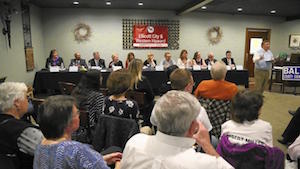Why Your Voice Matters
The Importance of Local Government
A nationwide average of 59% of eligible voters cast their ballots during the 2016 presidential election, according to the Associated Press elections API. The question is, what happened to the other 31%?
One extremely common reason why people skip voting is because they feel as though their individual vote does not matter. There is nearly 326 million people living in the United States, and upward of 235 million of those are 18 or older, according to API.
Although it may seem like one vote is miniscule in comparison to the results of the ballot, every individual vote contributes to the total. Voting is crucial to the American government system, which is set up so that the policies reflect what the people want on different tiers.
Senior Knowledge Wells explained, “Local government is important for the people to have a sense of control and impact within their government, thus being more likely to accept changes.”
Having government at different levels allows citizens to participate by sharing local concerns and outlooks with their representatives, especially within state and county legislative branches.

“Local politics and government is pretty important in our community,” noted Sophomore Josh Drasin. “They might have the same or even more power than the state or federal government, as they deal with many day to day issues of the county’s present needs rather than overarching bills that the state and federal government are tasked with.”
While government is often associated with corruption and inhospitality, it is actually quite the opposite. More specifically, Howard County officials encourage citizens to be active in the community by attending town halls and voicing any concerns via email, written letter, phone call, or even appointments. After all, representatives’ job is to make the county a better place for its inhabitants.
“In summary,” began Drasin, “The importance of local government stems from the fact that all specifications, the smaller things in one’s life (as opposed to overarching things such as healthcare and gun laws) are determined and set forth at the local level.”
The common belief that the government does not take citizens’ opinions into account is a myth. This is usually paired with the claim that legislation is never suited to what the citizens actually want.
On the contrary, it is difficult to gauge what citizens want when there is nothing to go on. A community in which citizens actively and often participate will reflect its citizens in its legislation. This leaves the question of how citizens should get involved.
“Everyone knows that they have freedom of speech,” remarked Ayan Hassan, a senior. “What we need to work on is helping everyone understand how to use that freedom of speech.”
“Student run outreach, activism, and government programs provide a surplus of opportunities,” Drasin listed when asked about ways students can get involved. He added additional strategies such as “using school resources to find adults who head certain governmental bodies and organizations, and contacting them to possibly campaign for them, intern for them, volunteer, and find out other opportunities.”
Drasin continued, “I think by finding the opportunities out there through student clubs and resources, local government and politics is fairly easy to get involved in, contrary to many stigmas surrounding it.”
There are plenty of resources and people who offer a way into participating in local government. Information is always available at schools, Community Outreach, any government building, or office.
“If everyone thought that [their vote has no impact], nothing would change and the world would be a silent place,” commented Drasin. “It all starts somewhere– involvement in government and change–why not it be with you and your voice?”
Hassan concluded, “People think one vote won’t make a difference, but it’s a group effort to start a storm. One vote can make all the difference.”

![Photo Courtesy of
A teen faces colorism at school and at home in 'Genesis Begins Again'
[Photograph]. (n.d.). NPR.https://www.npr.org/2019/01/31/690381040/a-teen-faces-colorism-at-school-and-at-home-in-genesis-begins-again
A complex-ion issue: Colorism [Photograph]. (n.d.). The Chronicle. https://hwchronicle.com/55860/features/a-complex-ion-issue-colorism/
The colorism issue [Photograph]. (n.d.). Issuu. https://issuu.com/overachievermagazine/docs/colourism
_issue_om](https://lrhslightningflash.com/wp-content/uploads/2021/06/Colorism-is-alive-475x380.jpg)
![Long Reach Boosters Club. (March 24, 2023 - 11:33pm). [Digital Image]. Long Reach Has Talent Show Spring 2023. Facebook, Retrieved April 17, 2023 from https://www.facebook.com/longreachboosters/posts/pfbid03kN5BKQj5TDefz1rtVZ5fTBBhjwA39UPPd8GctyMgFvY7B4RihH4rY4EqE7xPwikl.](https://lrhslightningflash.com/wp-content/uploads/2023/05/LR-Talent-Show-3-475x316.jpg)

